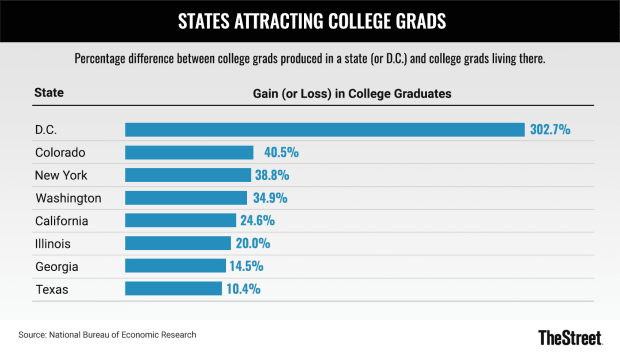Finishing college in a small town and then moving to the big city for a high-flying job has been the plot of many a Hollywood film — some stay in-state to save money while others specifically seek out university towns for that true "college experience."
A big university can also become a major source of economic growth for a rural part of the country — a flow of young people and academics breathes life into a given town while the jobs that come with keeping a college functional creates employment at all levels of the economy.
And while students coming and going is a normal part of that process, states fight hard to keep it from happening too much as many fund public universities have the specific goal of stimulating the local economy and creating a better-educated workforce.
After College, D.C. Starts Calling
According to a recent academic paper first reported by the Washington Post, the nation's capital was the single biggest draw for college graduates across the country — Washington, D.C. has 302.7% more people with college degrees than graduated there.
By contrast, states like Vermont and West Virginia are losing grads shortly after they finish their education. The difference between college grads in the states and those who got their education there were a respective -57.5% and -56.2%.
The research was done by a team of economists from the University of North Carolina, the W.E. Upjohn Institute, the University of Michigan and the University of Chicago.
New Hampshire, Rhode Island, Kansas, Virginia, Wyoming and Mississippi were all states that had more than 40% fewer graduates than had finished their schooling there.

TheStreet
While D.C.'s high concentration of political opportunities and high-paying jobs led it to the top of the list, Colorado, New York and Washington State all see high numbers of well-educated grads both stay and come in after finishing their education elsewhere.
Unsurprisingly, these are all hubs of high-paying jobs — from Amazon (AMZN) in Seattle to New York as the center of many international companies and financial jobs.
As the numbers reflect the state overall, it is worth noting that the numbers are particularly high for cities like NYC, Atlanta and San Francisco simply because of the high concentration of jobs there.
College As a Way of Creating Jobs
California, Illinois, Georgia, Texas, Minnesota and Massachusetts all see more graduates than graduated there.
The researchers point out that states like California, Georgia and Florida are particularly good at breaking even and retaining those who graduated there. More than 80% of those who graduate in California or Texas end up staying there.
In Vermont, West Virginia and Rhode Island, that number is below 50%.
Many of these trends are inevitable given the fact that many dream of high-profile jobs in New York and D.C. and go to college specifically to achieve that end. But brain drain also exacerbates existing inequalities and creates "two Americas" in which some areas are flourishing and others languish.
To avoid brain drain, some states work to draw and retain well-educated grads — in 2018, Vermont signed a law that pays $10,000 to college educated remote workers who come to the state.
Similar initiatives were taken on by in Kansas, West Virginia and Manitoba in Canada.







